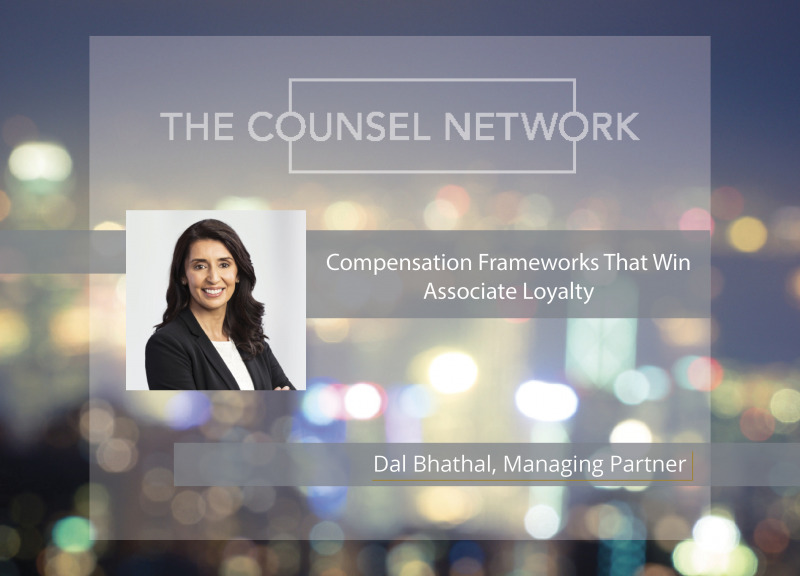Compensation Frameworks That Win Associate Loyalty
Win-win compensation frameworks do not necessarily require paying more; they simply require a clear understanding of your firm’s objectives and the type of promising legal candidate necessary to accomplish them. Designing a compensation structure that encourages engagement and rewards in meaningful ways designed outcomes and behaviours will cultivate a win-win opportunity that fosters Associate loyalty long term.
Employers embracing win-win frameworks, view their Associates as team members, not as “servants.” The partnership allows them into the huddle inspiring them to accomplish corporate objectives. Such objectives could include gaining a larger share of a client’s business, furthering the firm’s reputation as a leader in the field, or maximizing profitability. Associates are savvy enough to recognize the more profitable the firm, the more generous it can be to its Associates.
Win-win employers take the time to understand the goals that drive their Associates. Such goals typically include developing expertise, competitive pay, and partnership opportunities.
Upon exploring the Associate’s goals, the employer may discover that their respective objectives are incompatible This allows both parties to proactively manage the relationship.
For some, conversations can be tricky. Employers often leave their Associates in the dark, fearing that information- sharing will leave the firm vulnerable, especially if their Associates flee to their competitors and leverage their knowledge. The bigger danger, however, comes in alienating Associates from the firm’s priorities, which breeds dispassionate lawyers and exponentially increases the likelihood that they will join another employer with a clearer vision for how they fit into their picture.
With a broad understanding of the firm’s objectives in mind, it is imperative to define the Associate’s role within the team and tailor a compensation agreement around it. Does the Associate’s primary value consist of increased billings to existing clients, or to bring in new clients, or to assume management duties to free up time for partners? Win-win compensation agreements require a high degree of transparency, as Associates must have a clear perspective on how their efforts add value to the firm, and in turn benefit them.
When it comes to compensation, as legal recruitment specialists we are on the front lines and we see it all.
In large firm or national-firm environments, compensation structures tend to be more defined and broadly applied to a large group of Associates. In these firms, which typically offer top-of-market salaries, the win-win approach has less to do with salaries and more about having a clear understanding of its Associates and their goals. The aim of firm leadership is to competitively rewarding exceptional performance.
In smaller or boutique environments, an example of a win-win compensation structure is when a firm informs Associates of their individual overhead costs, and fix their compensation to their billings beyond overhead and salary, allowing the Associates to keep 30 to 60 per cent of their billings beyond certain thresholds. In this approach, the employer wins by spreading out their fixed costs, and both parties have a clear understanding of the mutual benefit of excess billings.
Other entrepreneurial firms provide origination credits (for example, 10 per cent of whatever is billed by others to the file), even to their junior Associates. These firms win by attracting new business and the Associate wins by being compensated for bringing in the work.
There are employers who struggle with retaining their Associates. Erroneously, it’s easy for them to point the finger at a younger generation of lawyers who they believe just aren’t willing to work hard anymore.
In our experience as legal recruitment specialists, this is simply not true. We work with numerous clients – both corporate legal departments and law firms of all sizes, who maintain highly productive and loyal Associates. Additionally, such employers benefit from backlogs of applications from top-tier candidates seeking to work in a more rewarding, attentive and innovative environment.
Employers who adopt a win-win framework in Associate compensation understand that their compensation structures must align their Associates to their corporate objectives, in order to properly motivate them towards mutual goals. These firms are more successful at keeping their Associates happy, productive and effective — and in turn, more profitable.
Dal Bhathal is a Managing Partner at The Counsel Network, a Canadian legal recruitment firm specializing in legal talent management strategies covering all levels of lawyers and practices for both corporate legal departments and law firms. To discuss effective Associate compensation strategies, contact Dal at dal@thecounselnetwork.com or 416.364.6654/604.643.1708.
Join our network to receive helpful news and information from the legal profession.
Follow us @Counsel_Network


